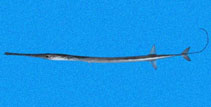| Family: |
Fistulariidae (Cornetfishes) |
| Max. size: |
106 cm TL (male/unsexed) |
| Environment: |
pelagic-neritic; marine |
| Distribution: |
Eastern Pacific: Southern California, Gulf of California and the western coast of Baja California, Mexico to Peru, including many offshore islands. |
| Diagnosis: |
Dorsal spines (total): 0-0; Dorsal soft rays (total): 17-20; Anal spines: 0-0; Anal soft rays: 16-19; Vertebrae: 75-76. Rows of spinules in skin easily seen but individual spinules difficult to discern. Color in life orange to red above, with brownish and black blotches. Lighter below. Dorsal and anal fins with orange bases. Caudal filament dusky (Ref. 9826). Branchiostegal rays: 5 (Ref. 36710). |
| Biology: |
Adults occur at depths greater than 30 m, along continental and insular margins (Ref. 36710), over rocky substrates (Ref. 37955). Feeds on small fishes (Ref. 37955). Marketed fresh, salted or dried and smoked but more frequently processed into fishmeal (Ref. 9301). |
| IUCN Red List Status: |
Least Concern (LC); Date assessed: 12 July 2016 Ref. (130435)
|
| Threat to humans: |
harmless |
Source and more info: www.fishbase.org. For personal, classroom, and other internal use only. Not for publication.

